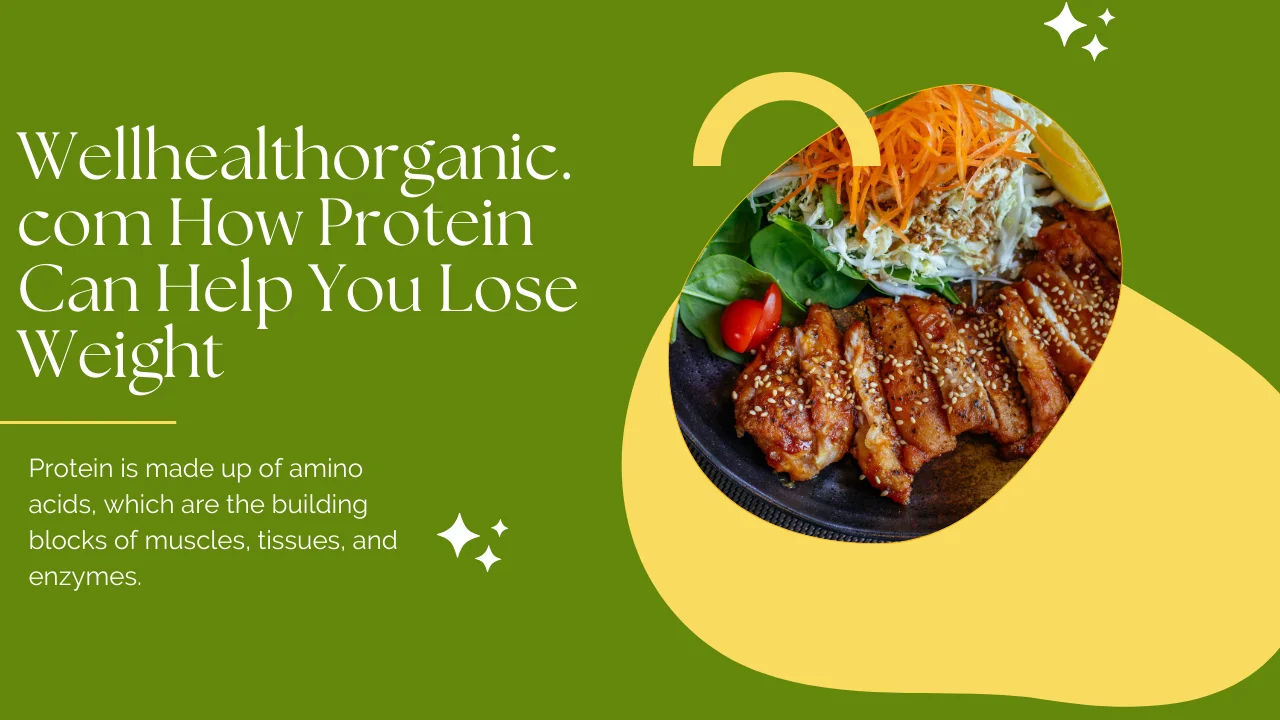Wellhealthorganic.com How Protein Can Help You Lose Weight

When it comes to weight loss, there are countless strategies, diets, and supplements available, but one of the most effective tools is already a key component of our daily diet: protein. This macronutrient plays a crucial role in various bodily functions, including muscle growth, tissue repair, and hormone production. However, many people are unaware that protein is also a powerful ally in weight loss. Understanding https://wellhealthorganic.com/how-protein-can-help-you-lose-weight can lead to more informed dietary choices and a more sustainable weight management plan.
What is Protein, and Why is It Important?
Protein is made up of amino acids, which are the building blocks of muscles, tissues, and enzymes. It is a macronutrient that the body requires to perform various functions such as repairing cells, producing enzymes and hormones, and supporting the immune system. Unlike fats and carbohydrates, protein has a unique advantage in weight management because of its ability to regulate hunger, support muscle retention, and increase metabolism.
But https://wellhealthorganic.com/how-protein-can-help-you-lose-weight is even more fascinating. The effects of protein on the body extend far beyond muscle building; it also directly impacts how our bodies store and burn fat.
Also Read: Wellhealth How to Build Muscle Tag Steps Guide
How Protein Increases Satiety
One of the main reasons https://wellhealthorganic.com/how-protein-can-help-you-lose-weight lies in its ability to keep you full. Protein-rich foods help curb hunger by promoting a feeling of satiety, or fullness. When you eat foods high in protein, they take longer to digest compared to carbohydrates and fats. This slower digestion helps keep hunger at bay, preventing overeating and snacking between meals. As a result, you consume fewer calories throughout the day without feeling deprived.
For example, incorporating protein-rich foods like eggs, chicken, or beans into your breakfast can reduce cravings and unhealthy snacking later in the day. In fact, studies have shown that people who eat a high-protein breakfast tend to eat fewer calories overall, which makes weight loss more manageable.
Also Read: Best Wellhealthorganic Home Remedies Tag and Recipe
Boosting Metabolism with Protein
Protein doesn’t just help with appetite control; it also boosts your metabolism. The body uses more energy to digest and metabolize protein than it does for fats and carbohydrates. This is known as the thermic effect of food. When you eat protein, your body burns more calories simply by processing the food. This means that incorporating more protein into your meals can lead to increased calorie expenditure, making it easier to lose weight.
By understanding https://wellhealthorganic.com/how-protein-can-help-you-lose-weight through metabolism, you can strategically plan your meals to maximize fat burning. For instance, replacing some carbs or fats in your diet with lean protein sources like turkey, tofu, or fish can lead to a slight increase in the number of calories your body burns throughout the day.
Protein Preserves Muscle Mass
When people lose weight, they often lose both fat and muscle mass. Losing muscle can slow down your metabolism because muscle burns more calories than fat. By consuming enough protein, you can preserve muscle while losing fat, which is essential for maintaining a healthy metabolism.
A high-protein diet during a calorie deficit helps your body focus on burning fat for energy rather than breaking down muscle tissue. This is another key factor in https://wellhealthorganic.com/how-protein-can-help-you-lose-weight. Whether you’re lifting weights or doing cardio, adding protein to your diet supports muscle retention, allowing you to burn more calories and reach your weight loss goals faster.
Reducing Cravings with Protein
Cravings for unhealthy foods can sabotage even the best weight loss plans. Thankfully, protein helps manage these cravings by stabilizing blood sugar levels. When your blood sugar remains steady, you are less likely to experience sudden hunger pangs or cravings for sweets and high-calorie snacks.
Knowing https://wellhealthorganic.com/how-protein-can-help-you-lose-weight through appetite control is particularly important for people who struggle with late-night snacking or emotional eating. By incorporating a high-protein snack like Greek yogurt or a handful of almonds into your routine, you can avoid those tempting but empty-calorie foods that derail your weight loss progress.

How to Incorporate More Protein into Your Diet
Now that you understand https://wellhealthorganic.com/how-protein-can-help-you-lose-weight, it’s time to incorporate it into your daily meals. For breakfast, consider eggs or a protein shake. For lunch, try grilled chicken or tofu with vegetables. At dinner, lean options like fish or legumes can keep you full and satisfied. If you’re looking for snacks, Greek yogurt, cottage cheese, or nuts are excellent choices.
Here’s an example of a high-protein meal plan for a day:
| Meal | Food | Protein (grams) |
|---|---|---|
| Breakfast | Scrambled eggs with spinach | 20g |
| Snack | Greek yogurt with berries | 15g |
| Lunch | Grilled chicken salad with quinoa | 30g |
| Snack | Almonds | 8g |
| Dinner | Grilled salmon with steamed broccoli | 35g |
How Protein Can Help You Lose Weight: A Scientific Perspective
In recent years, the role of protein in weight loss has been widely researched, and the findings are compelling. Protein is not only a vital macronutrient for building and repairing tissues, but it also plays a pivotal role in weight management. Understanding https://wellhealthorganic.com/how-protein-can-help-you-lose-weight can help you make smarter food choices that support your long-term health and fitness goals.
What Exactly Is Protein?
Protein is made up of amino acids, which are the building blocks for muscles, tissues, enzymes, and hormones. Your body requires protein for numerous essential functions, from repairing tissues to synthesizing enzymes and supporting the immune system. But what many people don’t realize is https://wellhealthorganic.com/how-protein-can-help-you-lose-weight by impacting various metabolic and physiological processes.
Research shows that protein can influence weight loss by controlling hunger, boosting metabolism, and preserving lean muscle mass—all factors that contribute to successful fat loss.
Also Read: The Power of Wellhealth Ayurvedic Health Tips
The Role of Protein in Appetite Control
One of the most well-documented benefits of protein is its ability to increase satiety. Unlike fats or carbohydrates, protein has a more substantial impact on reducing hunger. When you consume protein-rich foods, they take longer to digest, leading to a prolonged feeling of fullness. This reduces your overall calorie intake and helps prevent overeating.
A study published in the American Journal of Clinical Nutrition showed that people who increased their protein intake to 30% of their daily calories consumed significantly fewer calories overall. This reduction in calorie intake resulted in sustained weight loss over time. Simply put, https://wellhealthorganic.com/how-protein-can-help-you-lose-weight is by naturally reducing the urge to snack between meals, leading to better portion control.
For example, consuming a high-protein breakfast can keep hunger at bay throughout the morning. Foods like eggs, Greek yogurt, or protein shakes have been shown to decrease cravings and keep people satisfied until their next meal.
Protein and Its Effect on Metabolism
Another crucial factor in https://wellhealthorganic.com/how-protein-can-help-you-lose-weight is its ability to boost metabolism. Protein has a higher thermic effect of food (TEF) compared to fats and carbohydrates. TEF refers to the energy required to digest, absorb, and metabolize nutrients. When you consume protein, your body has to work harder to process it, thus burning more calories in the process.
Studies suggest that a high-protein diet can increase metabolic rate by 80 to 100 calories per day, which may not seem like much, but it adds up over time. This means that even when you’re resting, your body is expending more energy just to break down the protein you eat.
By focusing on a diet that includes lean proteins such as chicken, fish, or legumes, you can take advantage of this metabolic boost. Replacing some carbohydrates or fats with high-quality protein can lead to long-term weight loss, as your body continues to burn more calories throughout the day.
Also Read: https://wellhealthorganic.com/Vitamin-e-Health-Benefits-And-Nutritional-Sources
Protein Preserves Lean Muscle Mass During Weight Loss
One of the challenges of losing weight is that it often involves losing not just fat, but muscle as well. Losing muscle is detrimental because muscle mass helps maintain a healthy metabolism. The more muscle you have, the more calories your body burns, even when you’re not exercising.
When you follow a calorie-restricted diet, your body tends to break down muscle for energy if you’re not consuming enough protein. However, by eating sufficient amounts of protein, you can help preserve your muscle mass, which in turn keeps your metabolism functioning optimally. This is one of the key ways how protein can help you lose weight effectively.
A study published in the Journal of Nutrition showed that individuals on a high-protein diet maintained more muscle mass and lost more fat compared to those on a lower-protein diet. For people who exercise regularly, especially those who engage in strength training, protein is essential for muscle repair and growth.
How Much Protein Do You Need for Weight Loss?
The amount of protein you need depends on various factors such as age, weight, activity level, and overall health goals. However, a common recommendation for weight loss is to aim for 1.6 to 2.2 grams of protein per kilogram of body weight. For someone who weighs 70 kilograms (around 154 pounds), this would translate to approximately 112 to 154 grams of protein per day.
To put this into perspective, here’s an example of a simple high-protein meal plan:
| Meal | Food | Protein (grams) |
|---|---|---|
| Breakfast | Scrambled eggs with avocado | 20g |
| Snack | Almonds and Greek yogurt | 15g |
| Lunch | Grilled chicken salad with mixed greens | 35g |
| Snack | Cottage cheese with berries | 12g |
| Dinner | Baked salmon with quinoa and vegetables | 40g |
This meal plan provides around 122 grams of protein, which falls within the recommended range for someone weighing 70 kilograms.
Also Read: Wellhealthorganic.com Simple Ways To Improve Digestive System in Hindi
Conclusion
By now, you should have a clear understanding of https://wellhealthorganic.com/how-protein-can-help-you-lose-weight. From increasing satiety to preserving muscle mass and boosting metabolism, protein is an essential nutrient for those aiming to shed pounds and improve overall health. It’s not just about adding more protein to your diet; it’s about making informed, sustainable changes that will benefit you in the long term. By eating protein-rich meals and snacks, you’ll find it easier to control your hunger, burn fat, and maintain muscle mass—all essential for successful weight loss.
Remember, the key to weight loss is consistency. So, whether you’re just beginning your weight loss journey or looking to refine your current plan, adding more protein to your diet can be a simple yet effective strategy to help you reach your goals.






